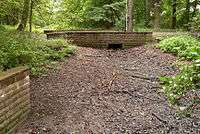Eilenriede
The Eilenriede is a 640-hectare (1,600-acre) municipal forest in Hannover, Germany. It is the largest urban city forest in Germany, and also one of the largest in Europe. The Eilenriede is nearly twice the size of Central Park. The biggest German urban "park" in the strict sense of the word, however, is the Englischer Garten München, with "only" 375-hectare (930-acre). (See also List of urban parks by size)

Size comparison
In Germany, the Eilenriede park is part of a group of inner-city or city near forest areas, like the Rostock Heath (6000 ha), the Dresden Heath (5900 ha), the Frankfurter Stadtwald (4800 ha) or the Berliner Grunewald (3000 ha). The Eilenriede is around the same size as the Stadtwald in Duisburg (600 ha) and is twice as big as Central Park (340 ha) in New York.
Name
The park's name Eilenriede is translated in English as alder moor, describing the park as a marsh populated with alder trees.
Location
Eilenriede encloses the south of the city from the northeast, east and southeast in form of the mirror-inverted letter C with a north-south extension of about 6 km. It reaches in the south west up to the Maschsee. The entire area is covered by an 130 kilometres (81 mi) long road network (80 km hiking, 38 km Bicycle, 11 km Riding).

 Blossom carpet on the ground in April
Blossom carpet on the ground in April Heiliger's well
Heiliger's well Historical bath place Teufelsbad (also called Kopperloch) near Heiligers Brunnen
Historical bath place Teufelsbad (also called Kopperloch) near Heiligers Brunnen Widespread water area which can be seen in spring in the south of Eilenriede
Widespread water area which can be seen in spring in the south of Eilenriede
Activities
The city forest offers a range of different possibilities in leisure activities, like:
- Hanover Zoo
- Strolls, Walks
- Horseback riding
- Bicycle riding
- Hiking
- Running
- Wood trails
- Children playground
- Woodstation
- Dendrology path
- Lawn for sunbathing
- Catering (Restaurants, Kioske, Waldcafés)
- Monuments, Memorials
- Minigolf
- Bob run
- Path for the blind
- Skating (skating area starting Lister Turm up to Steuerndieb)
- High rope course
 Lawn for sunbathing
Lawn for sunbathing Entry to the kids playground WAKITU (Waldkindertummelplatz)
Entry to the kids playground WAKITU (Waldkindertummelplatz) Kiosk inside the forst
Kiosk inside the forst Waldcafé
Waldcafé
Literature
- Kemper, Edwin/ Nowak, Helmut (Hrsg.): Eilenriede-Festschrift. Beihefte zu den Berichten der Naturhistorischen Gesellschaft zu Hannover, Heft 7, Hannover 1971.
- Hans Brauns u.a.: Die Eilenriede. Sonderheft der Hannoversche Geschichtsblätter, herausgegeben vom Stadtarchiv der Landeshauptstadt Hannover, Hannover, Eigenverlag, 1938.
- H.-W. Heine: Die mittelalterliche Landwehr von Hannover in: Führer zu vor- und frühgeschichtlichen Denkmälern 49 (1981), S. 48–55
- August Jugler: Die Eilenriede in alter Zeit. Ein Kulturbild aus Hannovers Vergangenheit. Hannover, Klindworths 1884.
- Speier, Martin; Pott, Richard: Der hannoversche Stadtwald "Eilenriede" in geobotanischer und historischer Sicht. In: Hundert Jahre Reinhold Tüxen. Geobotanik und Vegetationsgeographie. Hrsg.: Richard Pott. Hannover 1999, S. 279-303.
- Bettina Borgemeister: Die Stadt und ihr Wald. Eine Untersuchung zur Waldgeschichte der Städte Göttingen und Hannover vom 13. bis zum 18. Jahrhundert. Hannover, Hahn 2005. (Veröffentlichungen der Historischen Kommission für Niedersachsen und Bremen. 228) ISBN 3-7752-6028-5.
- Joachim Lehrmann: Räuberbanden zwischen Harz und Weser. Lehrte, Lehrmann-Verlag 2004. ISBN 3-9803642-4-0. (darin ausführlich Hannovers Raubmörder Hanebuth)
- Stadtwälder in Hannover - Die Eilenriede. Broschüre als aktualisierte Neuauflage von 2004, Hannover.
- Eilenriedekarte, Maßstab 1:10.000. 3. Auflage, Hannover. (Broschüre und Karte kostenlos bei: Fachbereich Umwelt und Stadtgrün der Landeshauptstadt Hannover)
- Janet Anschütz (Autorin), ADAC Niedersachsen Sachsen-Anhalt (Herausgeber): Motorrad Rennsport: Internationale Eilenriede-Rennen zu Hannover 1924-1955. MatrixMedia-Verlag 2009. ISBN 978-3-932313-34-9
- Woldemar Lange; Jörg Buschmann (2009), Die große Zeit des DKW-Motorradrennsports : 1920 bis 1941 (Zschopau) (in German) (1. ed.), Witzschdorf: Bildverlag Böttger GbR, p. 368, ISBN 978-3-937496-29-0 (zu Eilenriede-Motorradrennen)
- Helmut Knocke, Hugo Thielen: Eilenriede, in: Hannover Kunst- und Kultur-Lexikon, S. 101ff.
- Eva Benz-Rababah: Eilenriede in: Stadtlexikon Hannover, S. 149
External links
| Wikimedia Commons has media related to Eilenriede. |
- Informationen über die Eilenriede bei www.hannover.de
- Description in german and images concerning the Eilenriede
- Hermann Löns über die Eilenriede 1907 im Aufsatz von Aadje Ziesenis
- Maßnahmenprogramm zu Entwicklung von Landschaftsräumen; Landeshauptstadt Hannover; (PDF, 3,26 MB)
- Holzgang und Diebstahl in Hannovers Stadtwald Eilenriede